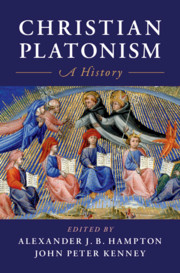Book contents
- Christian Platonism
- Christian Platonism
- Copyright page
- Dedication
- Contents
- Figures
- Contributors
- Acknowledgements
- I Concepts
- II History
- 2.1 The Bible and Early Christian Platonism
- 2.2 Platonism and Christianity in Late Antiquity
- 2.3 Christian Platonism in the Medieval West
- 2.4 Christian Platonism in Byzantium
- 2.5 Renaissance Christian Platonism and Ficino
- 2.6 Northern Renaissance Platonism from Nicholas of Cusa to Jacob Böhme
- 2.7 Christian Platonism in Early Modernity
- 2.8 Christian Platonism in the Age of Romanticism
- 2.9 Christian Platonism and Modernity
- III Engagements
- Index
- References
2.4 - Christian Platonism in Byzantium
from II - History
Published online by Cambridge University Press: 20 January 2021
- Christian Platonism
- Christian Platonism
- Copyright page
- Dedication
- Contents
- Figures
- Contributors
- Acknowledgements
- I Concepts
- II History
- 2.1 The Bible and Early Christian Platonism
- 2.2 Platonism and Christianity in Late Antiquity
- 2.3 Christian Platonism in the Medieval West
- 2.4 Christian Platonism in Byzantium
- 2.5 Renaissance Christian Platonism and Ficino
- 2.6 Northern Renaissance Platonism from Nicholas of Cusa to Jacob Böhme
- 2.7 Christian Platonism in Early Modernity
- 2.8 Christian Platonism in the Age of Romanticism
- 2.9 Christian Platonism and Modernity
- III Engagements
- Index
- References
Summary
Platonism in Byzantine Christianity is a complex topic since diverse traditions of Platonism had an impact on Byzantine theologians. This chapter considers three central thinkers: Dionysius the Areopagite, St Maximus the Confessor, and St Gregory Palamas. It discusses the ‘diffused Platonism’ of these Christian thinkers whose thought included Platonic doctrines such as the radical transcendence of God, the doctrine of providence, the doctrine of Forms as creative logoi in the mind of the Creator, the Plotinian doctrine of double activity, and the late antique doctrine of procession and conversion. Notions like these were established as parts of a general outlook of Byzantine Christian thought. The chapter concludes with a discussion of John Philoponus and John of Damascus.
- Type
- Chapter
- Information
- Christian PlatonismA History, pp. 207 - 226Publisher: Cambridge University PressPrint publication year: 2020

